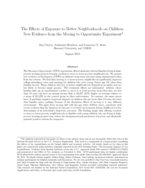Found 23 resources.
0
0
0
Children experiencing homelessness or living in inadequate and unstable housing are exposed to many risks, including a heightened threat of involvement with the child welfare system. Can child welfare agencies play a role in addressing the lack of affordable housing? What if providing housing, plus other supportive services, could prevent out-of-home placements to foster care? What if, for those children already in foster care, it could help them reunify with their parents?
Topics: Child welfare, Research, Stability, Supportive housing
 Shared by Housing Is
on May 30, 2019
Shared by Housing Is
on May 30, 2019 0
0
0

Early childhood education programs can impact life outcomes in ways that span generations, according to new research from Nobel laureate James Heckman. In a pair of companion papers released this week, the pioneering University of Chicago economist found that the children of those who participated in a landmark 1960s study still saw improvements in education, health and employment. The children saw such benefits without participating in the same preschool program as their parents—suggesting that early education can contribute to lasting upward mobility and help break cycles of poverty
Topics: Child welfare, Dual-generation, Early childhood, Family engagement, Research
 Shared by Housing Is
on May 21, 2019
Shared by Housing Is
on May 21, 2019 0
0
0
In 2015, approximately 21,000 youth in the United States became emancipated-commonly referred to as "aged out"-from the foster care system; neither being adopted nor reunified with their family of origin, and were therefore expected to live independent lives. In addition to the youth who aged out, nearly 1,000 youth ran away from foster care. Over the past two decades, studies have consistently indicated a strong association between experiencing homelessness and having prior placement in the foster care system. Youth who age out of foster care are among the populations at the...
Topics: Child welfare, Homelessness, Housing, Research, Youth
 Shared by Housing Is
on Apr 4, 2019
Shared by Housing Is
on Apr 4, 2019 0
0
0
Homelessness during pregnancy poses significant health risks for mothers and infants. As health care providers increase their emphasis on social determinants of health, it is important to understand how unstable housing contributes to complications during pregnancy. We linked data about emergency shelter enrollees with Massachusetts Medicaid claims for the period January 1, 2008–June 30, 2015 to compare health care use and pregnancy complications for 9,124 women who used emergency shelter with those for 8,757 similar women who did not. Rates of mental illness and substance use disorders were...
Topics: Child welfare, Depression, Early childhood, Homelessness, Housing, Low-income, Mental health, Pre-natal, Research, Substance abuse
 Shared by Housing Is
on Mar 26, 2019
Shared by Housing Is
on Mar 26, 2019 0
0
0
The Supplemental Security Income (SSI) program is an important, means-tested source of income for the families of children with disabilities. Although some research has shown that SSI improves outcomes for these families, policymakers have been concerned about the program’s growth and the poor outcomes that many former child SSI recipients experience in adulthood. In this brief, we summarize research funded by SSA’s Disability Resource Consortium (DRC) on the program’s recent growth and the factors related to receipt of SSI by children. This research reveals dramatic variation in the rate of...
Topics: Child welfare, Disabilities, Health, Low-income, Research
 Shared by Housing Is
on Mar 18, 2019
Shared by Housing Is
on Mar 18, 2019 0
0
0
Findings from a national descriptive study of Early Head Start-Child Care Partnerships reveal new information about how partnerships expand access to high quality, affordable care for infants and toddlers. The study describes characteristics of these partnerships, including how they were formed and operated, as well as strategies for implementing partnerships in both center-based child care and family child care homes. It also describes the wide range of services that partnerships offer to children and families who receive care through Early Head Start-Child Care Partnership grant funds....
Topics: Child welfare, Early childhood, Low-income, Research
 Shared by Housing Is
on Mar 15, 2019
Shared by Housing Is
on Mar 15, 2019 0
0
0

The number of kids enrolled in Medicaid and the Children’s Health Insurance Program (CHIP) — two government health plans for the poor — fell by nearly 600,000 in the first 11 months of 2018, a precipitous drop that has puzzled and alarmed many health policy analysts, while several states say it reflects the good news of an improving economy.
Topics: Affordable Care Act, Child welfare, Early childhood, Health, Legislation & Policy, Low-income, Medicaid / Medicare, Research, Youth
 Shared by Housing Is
on Mar 8, 2019
Shared by Housing Is
on Mar 8, 2019 0
0
0

Nearly 115,000 students in New York City schools experienced homelessness during the 2017–18 school year, according to new data released by the New York State Education Department (NYSED) last month. As reported by the New York Times, that figure represents 1 in 10 New York City public and charter school students. Our look at the data on noncharter public school students shows that even that alarming share hides the pervasiveness of student homelessness in some communities.
Topics: Child welfare, East Coast, Education, Homelessness, Housing, Low-income, Racial inequalities, Research, Youth
0
0
0
How does the quality of where we live affect our children’s development? The impact of housing and neighborhood quality on physical health has long been studied in the public health field, but studies that aim to assess those same impacts on mental health are less common. This study examined the relationship between the physical quality of housing and neighborhoods and their interactive effect on the mental health and motivation of children from elementary school through young adulthood.
Topics: Child welfare, Community development, Housing, Low-income, Mental health, Racial inequalities, Research, Youth
0
0
0
Most states use an education funding formula to allocate state and local dollars to school districts. Most funding formulas attempt to account for student poverty, among other factors, in distributing funds. But there are several ways to count low-income students and even more ways to tie dollars to these student counts.
Topics: Child welfare, Education, Legislation & Policy, Low-income, Place-based, Research, Stability, Youth
0
0
0
For decades, free and reduced-price lunch (FRPL) status has been used as a proxy measure for student poverty. Families filled out paper lunch forms, and these were the basis for allocating resources to schools, defining accountability goals, and conducting research. But recent changes to the National School Lunch Program mean that FRPL status is in decline as a measure of student need, and states are turning to alternatives.
Topics: Child welfare, Education, Food insecurity, Health, Legislation & Policy, Low-income, Metrics, Research, Youth
0
0
0
Are families prioritizing their housing payments by jeopardizing their health and well-being, missing utility payments, skipping meals, or failing to keep up with medical needs or medical bills? And are renters less able than homeowners to weather a financial emergency, such as an unexpected medical expense? Our research suggests this may be the case.
Topics: Asset building, Child welfare, Food insecurity, Health, Homelessness, Housing, Low-income, Research, Stability
0
0
0

Many low-income families in the United States face challenges associated with unemployment, health, and education disparities. To help overcome these challenges, several federal programs aim to assist these families with employment, self-sufficiency, healthy relationships, and individual well-being. Understanding the effects of these programs, including whether they meet the needs of those they intend to serve, requires a strong partner. Mathematica’s team of seasoned experts has worked closely with the Administration for Children and Families (ACF), Office of Planning, Research, and...
Topics: Asset building, Child welfare, Dual-generation, Family engagement, Low-income, Research, Stability
0
0
0
The evidence on how homelessness affects children suggests policymakers should be doing everything possible to prevent homelessness and, when families who do lose their housing, to help them exit homelessness and stabilize in housing quickly. Rapid re-housing (RRH) can help homeless families in crisis.
Topics: Child welfare, Health, Homelessness, Housing, Legislation & Policy, Low-income, Research, Stability
0
0
0
Using multiple panels from the US Census Bureau’s Survey of Income and Program Participation, we find that participation in Temporary Assistance for Needy Families, the Supplemental Nutrition Assistance Program (SNAP), or public health insurance reduces the number of hardships low-income families with children experience by 48 percent and reduces the share who experience food insufficiency by 72 percent.
Topics: Child welfare, Cost effectiveness, Food insecurity, Legislation & Policy, Low-income, Medicaid / Medicare, Metrics, Research, Stability
0
0
0

Current efforts to end homelessness are largely focused on the immediate housing needs of adults. Yet recent research further demonstrates the importance of addressing childhood, early care, and education in efforts to prevent and end homelessness. This blog post summarizes five new studies. Topics include homelessness in the womb and during infancy; the Adverse Childhood Experiences of homeless adults; the employment of families during and after stays in homeless shelters; and the impact of Rapid Rehousing on the education of children and youth experiencing homelessness.
Topics: Child welfare, Dual-generation, Early childhood, Education, Health, Homelessness, Housing, Low-income, Pre-natal, Research
0
0
0

Two new research briefs use recent data from the Head Start Family and Child Experiences Survey (FACES 2014) to explore characteristics of children enrolled in Head Start and the leaders and teachers who guide the programs.
Topics: Child welfare, Early childhood, Low-income, Research, School-readiness
0
0
0
Using administrative data from Massachusetts, this study analyzes the health care use and Medicaid expenditures of families who experienced one or more homeless episodes between 2008 and 2015 to investigate how health care use is related to emergency housing experiences.
Topics: Asthma, Child welfare, Depression, Health, Homelessness, Housing, Low-income, Medicaid / Medicare, Metrics, Pre-natal, Research
0
0
0
The study finds three out of five adults across the U.S. had at least one adverse experience in their childhood, such as divorce, a parent's death, physical or emotional abuse, or a family member's incarceration or substance abuse problem. A quarter of adults have at least three such experiences in childhood, which – according to other research — increases their risk for most common chronic diseases, from heart disease and cancer to depression and substance abuse.
Topics: Child welfare, Depression, Early childhood, Low-income, Mental health, Racial inequalities, Research
0
0
0
Homelessness among children is correlated with developmental delays, fair or poor health, and high healthcare utilization. Associations of homelessness specifically among infants younger than 12 months, however, are unknown. This study evaluates homelessness during infancy as a risk for adverse infant and maternal health and hardship.
Topics: Child welfare, Depression, Disabilities, Dual-generation, Early childhood, Education, Family engagement, Food insecurity, Grade-level proficiency, Health, Homelessness, Housing, Low-income, Metrics, Partnerships, Pre-natal, Research, School-readiness, Youth
 Shared by Housing Is
on Aug 1, 2018
Shared by Housing Is
on Aug 1, 2018 0
0
0
The Moving to Opportunity (MTO) experiment offered randomly selected families living in highpoverty housing projects housing vouchers to move to lower-poverty neighborhoods. We present new evidence on the impacts of MTO on children’s long-term outcomes using administrative data from tax returns. We find that moving to a lower-poverty neighborhood significantly improves college attendance rates and earnings for children who were young (below age 13) when their families moved. These children also live in better neighborhoods themselves as adults and are less likely to become single parents. The...
Topics: Child welfare, Cost effectiveness, Dual-generation, Education, Housing, Low-income, Mobility, Research
 Shared by Housing Is
on Jul 23, 2018
Shared by Housing Is
on Jul 23, 2018 0
0
0

A new study suggests that America’s great nutritional divide goes deeper than the problem of food access within cities.
Topics: Child welfare, Food insecurity, Health, Low-income, Nutrition, Obesity, Racial inequalities, Research
 Shared by Housing Is
on Jul 5, 2018
Shared by Housing Is
on Jul 5, 2018 

